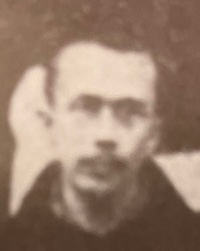 |
| Fr. Frederic Dunne at his election as abbot. Note his motto at the top of the photo. Photo is from the book, The Less Traveled Road |
The “small world” adage seems appropriate as I write this. How else to explain the link I found between the Florida frontier and one of the greatest spiritual writers of the 20th century?
That writer is Thomas Merton. The Florida link is Dom Frederic Dunne. He was the abbot at the Abbey of Gethsemani who accepted Merton into the Trappist monastery in 1941. That happened in Kentucky, a long way from Florida. But Fr. Dunne not only had roots in Florida, he had roots in a Catholic colony established in the Florida wilderness in the early 1880s.
At Gethsemani, Dunne noticed Merton’s talent and encouraged him to write. I believe he ordered him under the monastic rule of obedience to continue writing even when Merton resisted. (If you’re not familiar with Merton, do a Google search and you’ll see just how impactful that order to write would be.)
Merton later acknowledged Dunne’s influence and impact on his writing. Over the years, Dunne also become a spiritual mentor and father figure for Merton. The two remained close until Dunne's death in 1948.
So who was this influential figure who spent part of his youth in the Florida wilderness? He was one of the 14 students who sat at the kitchen table of Catholic home-school pioneer Cecelia Morse in the frontier settlement of San Antonio in south central Florida. I wrote a post about Mrs. Morse and her school a few months ago: https://frontier-florida.blogspot.com/2024/07/home-school-mom-catholic-ed-pioneer.html.
The settlement was a Catholic colony established by Dunne’s uncle. The younger Dunne spent some of his formative years there, between the ages of 11 and 16. This included years when his own father worked away from home because jobs were scarce on the frontier.
A spiritual memoir about Dunne shares some important background about his years in the tiny Florida community. The Less Traveled Road by Rev. M. Raymond was published in 1953. Raymond was a monk at the Abbey of Gethsemani and he knew both Merton and Dunne
In his book, Raymond draws parallels between the silence and solitude Dunne experienced in the wilderness environment and the silence and solitude he found at the Trappist monastery. Raymond also notes how the hardships of frontier life laid a foundation for the austerity of monastery life.
Raymond drew on firsthand reminiscences of one of Dunne’s sisters about the family’s life in Florida - and just how solitary it was. For example, it took a week to travel to and from Tampa, a distance of 32 miles. The Catholic colony was also 45 miles from the nearest railroad.
Dunne attended Mrs. Morse’s frontier homeschool for about four years before starting carpentry work to help support his family. Raymond believes the teacher gave Dunne’s intellect a solid formation. Dunne himself credited Mrs. Morse, his brothers, his older sister Katherine - who helped raise him after their mother died — and his uncle, colony founder Capt. Hugh Dunne, with providing guidance in the years when his father lived and worked many miles from home.
Another frontier influence was the establishment of a Benedictine monastery in the colony. Dunne gained firsthand knowledge about religious life in a place far removed from centers of Catholicism and centers of society.
All those experiences helped shaped the abbot that Dunne was to become. He entered Gethsemani in 1894 and became abbot in 1935.
Dunne became renowned not just for guiding Merton, but also for the expansion he oversaw at Gethsemani in his years as prior and abbot. Yet by all accounts he remained humble, hard-working, down-to-earth, astute and intuitive. He’s a man I would have liked to know.
 |
| Frederic Dunne as a young man. Photo is from The Less Traveled Road. |

No comments:
Post a Comment